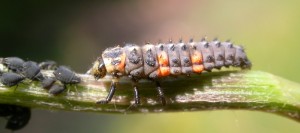Neonicotinoids – A Word Everyone Should Know
‘Neonicotinoids’ … a clunky word, but one that everybody should know. They (‘neonics’ for short) are the most widely used insecticides in the world – they’re now found in almost every managed landscape from farms to home gardens (and use is increasing rapidly). Neonics are non-targeted (ie.lazy) pest control: they’re usually coated on seeds and the poison stays in the plant as it grows. And the residue can remain in plant tissue, pollen, soil and water for years – it’s these residues that can kill beneficial wildlife: bees, birds, soil creatures and helper insects. That makes neonics a threat to our food supply because:
- Bees and other pollinators directly provide much of our food
- Soil creatures (worms, microbes) are vital for soil health
- Helper insects (predatory and parasitic species) provide natural pest control
Why would we want to harm any of these? The EU has put a two year ban on neonics (because of damage to bees)but they are still used in NZ and are available to the public. Let’s ask garden and hardware shops to stop selling them (Placemakers and The Warehouse have recently withdrawn them) and the EPA to ban them.
Research: neonicotinoids harming honey bees
Report: effect of neonicotinoids on beneficial insects.
 The larval stage of a ladybird (right) loves to eat aphids (left) – great natural pest control.
The larval stage of a ladybird (right) loves to eat aphids (left) – great natural pest control.
Tags: connections, food, Gardening, honey bees, science